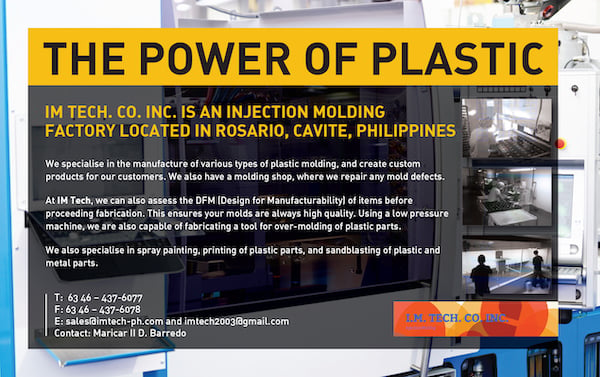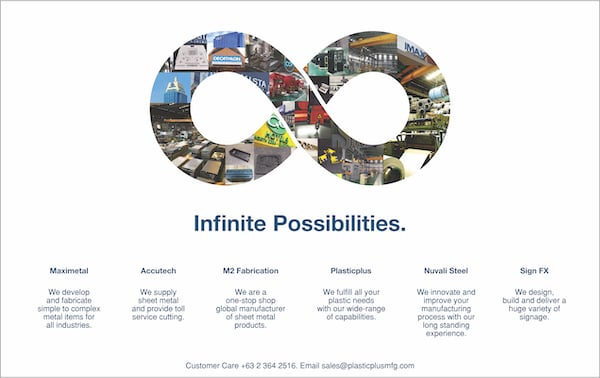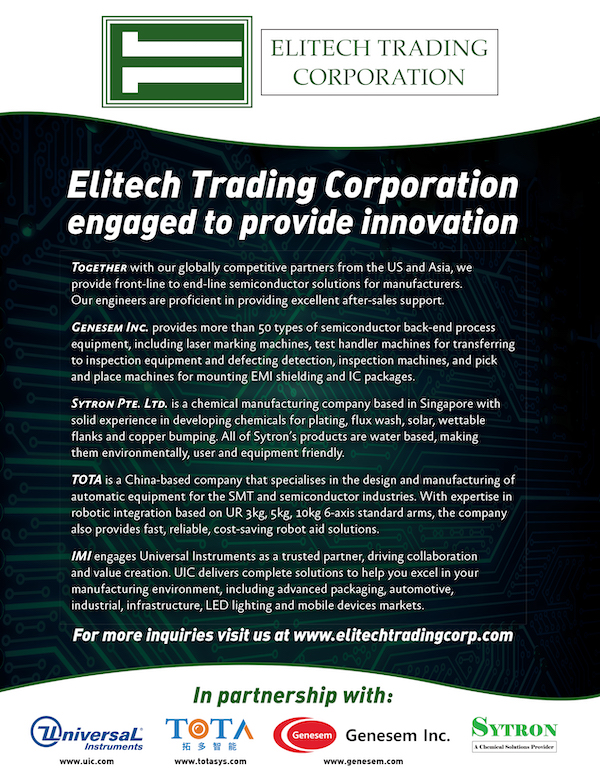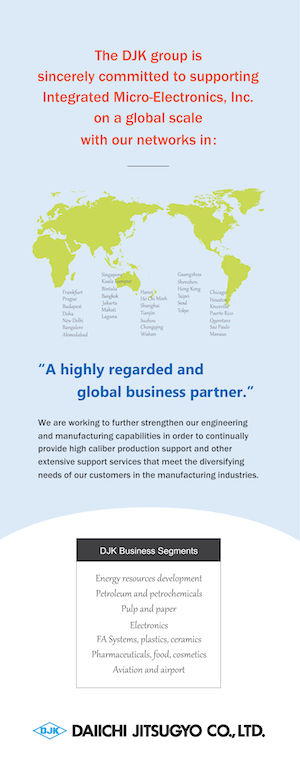From humble beginnings to the fifth largest EMS automotive provider in the world, Integrated Micro-Electronics, Inc. (IMI) is unstoppable. It all started in the summer of 1980 when IMI, a wholly-owned subsidiary of Ayala Corporation, first opened its doors in the Philippines. Providing electronics manufacturing services (EMS), power semiconductor assembly and test services, this future-forward company’s success skyrocketed, taking it global.
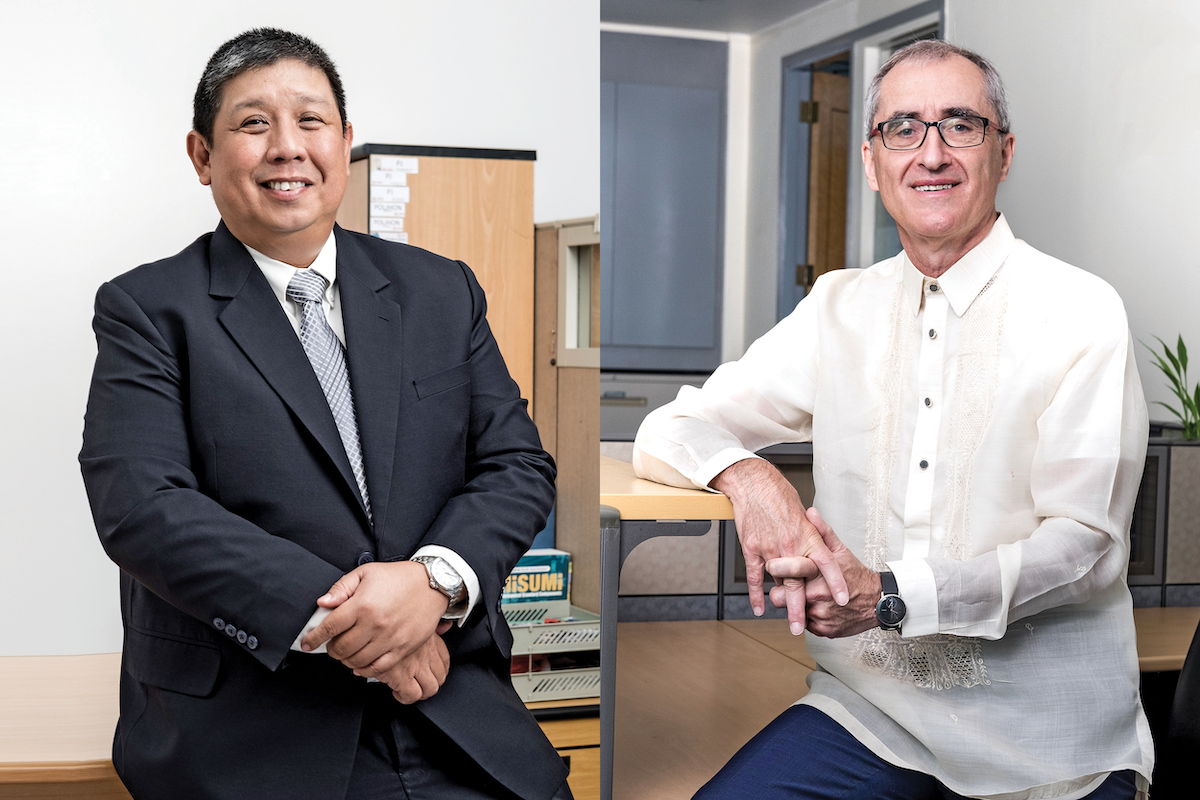
Now, IMI has more than 20 factories all over the world. “We have factories in Mexico, Serbia, Bulgaria, the Czech Republic, Germany, China, Japan, the UK and the US,” Head of Philippines Operations Bernie Santos says.
“It makes me proud that I am part of an organisation that has grown successfully from a local Filipino company to a global company. Even more than pride, IMI is providing inspiration for other Filipino companies – ‘if we can do this, you can too.’”
Bernie, who celebrated his 27th year with IMI in September, started the early part of his career at this leading global manufacturing solutions company. “This might sound cheesy, but I always wanted to work for a Philippine company more than a multinational company,” he remembers. “So, I jumped at the opportunity to work for IMI.
“Since, my vision for IMI is to be like our parent company Ayala Corporation – a company that has maintained resiliency despite many historical economic ups and downs of the country. A company that people admire because of the culture and core values thereby becoming an employer of choice.”
Joining in 1992, Bernie went from engineering to sales to taking on the role as a “mini CEO”. In 2014, he was promoted as the Head of Philippines Operations. Knowing the company’s location in the Philippines was a disadvantage, he set forth a plan that would capitalise on its strength.
“Different companies have different strategies, and it’s not a matter of whether one is right or wrong. It’s just a matter of which path is taken and the execution,” Bernie explains. “In our case, rather than competing solely in terms of cost, we are intent on providing differentiation to our customers by providing more value. There has to be something really different that will make the customer choose IMI over other companies.”
This “X-factor” IMI delivers is its expertise. Beyond simply providing products, the company is also well-positioned to provide solutions. “Our manufacturing setup is similar to other companies, so we created what we call technical platforms to show a certain level of expertise,” Bernie shares.
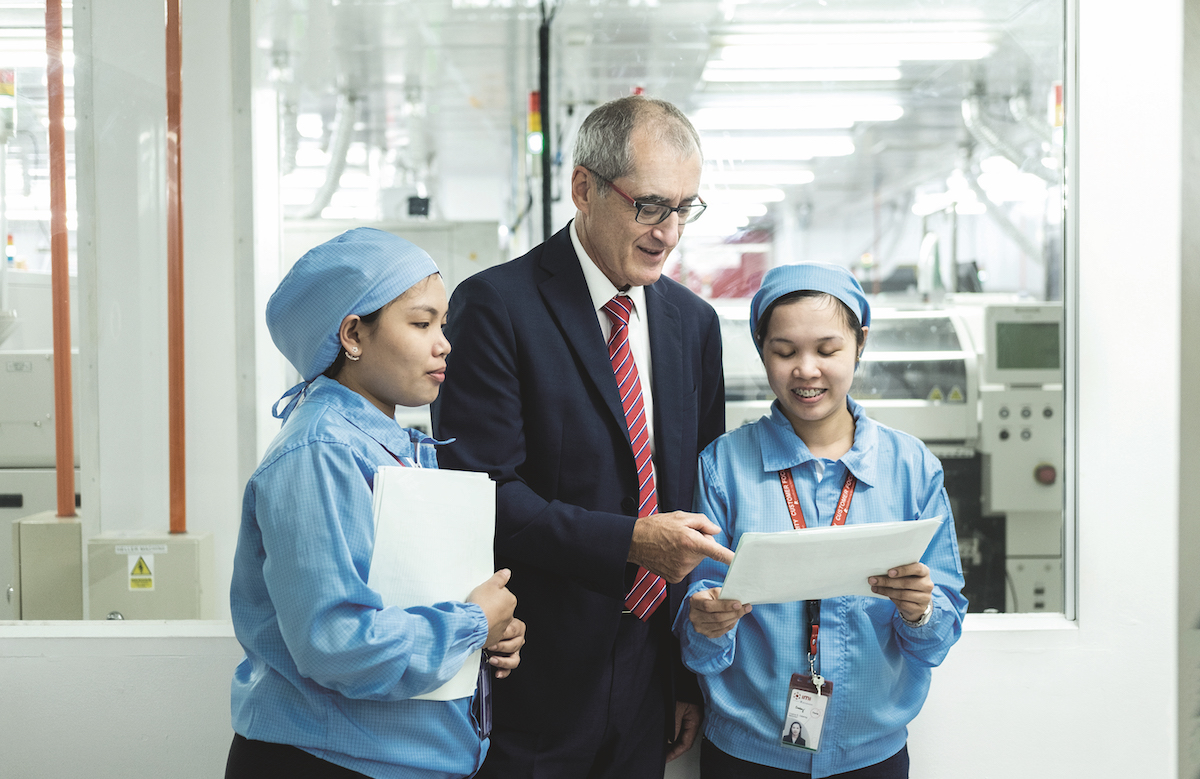
“Now, we can market IMI not only as a manufacturer but as a solutions partner as well. In doing this, we built more advanced manufacturing capabilities, which have allowed us to grab opportunities that others are not able to take. Now, we are better able to maintain our growth trajectory despite the stiff competition.”
Over the years, IMI has experienced tremendous growth, yielding the company a unique, yet cohesive portfolio of capabilities and skill sets. When Gilles Bernard came on board as President and COO in 2011, he looked at the service performance of IMI’s worldwide manufacturing plants and, where Bernie came in to differentiate, Gilles worked to integrate.
“When I joined IMI, I implemented the alignment of all the operations to ensure the service performance from all 21 manufacturing plants in the 10 countries where IMI is present would be exactly the same despite the difference in language, history, culture or equipment used,” Gilles explains.
As a result, all of IMI’s plants now have exactly the same key performance indicators and regular, monthly conduct assessments. “Now, they can share their best practises among themselves. All key functions have the same job description and are evaluated in the same way,” he shares.
“This discipline in alignment and coordination complements our methodology and system of full transparency among our various sites, while continuously sharing lessons learned and our quest of excellence.”
This new initiative also came with a surprising benefit – a beautifully, melodic celebration of diversity. “Our strength lies, among other things, in our ability to harmonise and take the best of a mix of cultural energies generated by IMI’s diverse management team,” Gilles explains.
“Our strength lies, among other things, in our ability to harmonise and take the best of a mix of cultural Energies generated by IMI’s diverse management team.” – Gilles
“Our headquarters may be based in Asia, but we have a global footprint and therefore a very diverse management team that understands the western methodology of engagement capable of operating in western environments. The variety of locations leads to a diversity in markets and operations and an increase in programs to accommodate the needs of a wider client base. This helps to ensure greater stability for us, as cultivating a broader, healthier mix of clients could protect the company from the effects of market downturns.”
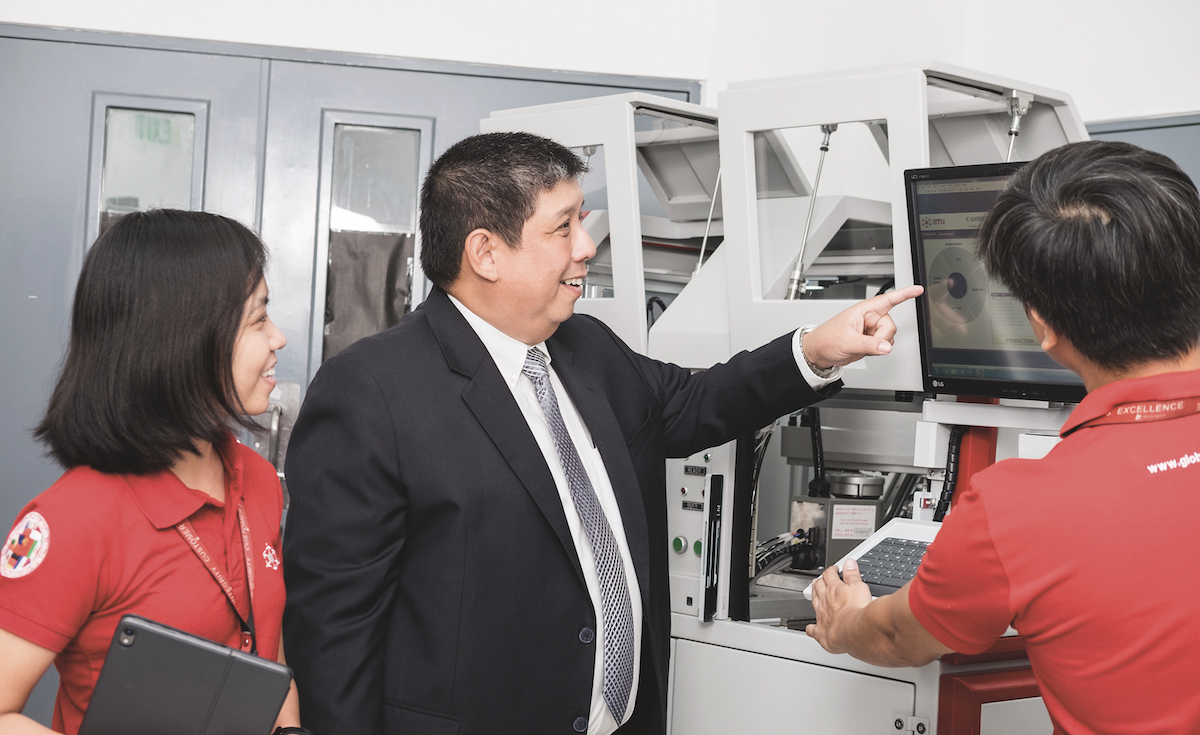
IMI also turns to innovation to maintain its security in the marketplace. “We continue to expand to higher value offerings,” Gilles says. “The use of technologies in the sphere of Industry 4.0 will become a powerful enabler, pushing the limits of manufacturing to reduce time to market. Robotics, automation and the industrial Internet of Things will be key trends driving these changes. And our global operations are well in line with the adoption of these technologies for flexible and customised scenarios at various levels depending on location, customer needs and resource availability.”
“What we’re trying to focus on now is the push on the innovation to augment and complement our design team to capture the different technologies we dive into,” Bernie adds.
“One of the challenges here is that the design engineers needed for this initiative are not available in the Philippines – they’re overseas. This makes them an expensive resource.”
To overcome this challenge, IMI is partnering with local universities. This will enable the company to secure budding talent that it can mould to meet its unique demands. “The key is early engagement with them,” Bernie stresses. “Then, we can really develop the students in a way that is aligned with the direction we’re going and with the technology we’re developing. It’s really a complementary partnership.”
Building relationships within the industry is crucial to any company’s success. When IMI can’t find the perfect partners, Bernie says, it makes them. “We’re building high-tech, safety-related automotive products and we make an effort to localise the majority of our products,” he explains.
“So, we look for local suppliers, and we train them to become qualified for automotive certification. It’s beneficial to both of us – they’re now able to capture more markets, and we are assured of high-quality products. And, on a national level, we can then say there’s a supply chain available with high-technology products for the automotive market as well.”
Beyond local, IMI depends on key supplier partners like I.M. TECH., Plastic Plus Manufacturing, Daiichi Jitsugyo and Elitech Trading, deeming them “a pillar of our success”. “We have a strategic alliance with these different suppliers who are mainly the manufacturers of semiconductor devices,” Bernie says.
“We consider them key suppliers because we can’t just buy these pieces from anywhere. We design their unique components into our product. They are among our valued partners that have been instrumental to our growth and success.”
Gilles’ biggest business influence?
Masaaki Imai, a Japanese organisational theorist and management consultant known for his work in quality management – specifically, the reduction or elimination of waste known as “muda.”
7 Types of Muda
- Defects in products
- Overproduction
- Inventory
- Unnecessary processing
- Unnecessary movement of people
- Movement of goods
- Waiting
“Partnering and closely collaborating with efficient companies like them, including companies such as Bosch, Valeo and Brose, among others, is one of the things I consider a great achievement,” Gilles adds.
“Being able to drive IMI to the fifth spot among the largest EMS automotive providers in the world per New Venture Research is up there too – IMI remains in the list of Top 20 EMS providers worldwide. I envision IMI with a strong and bright future thanks to our core values of excellence, integrity, customer focus and concern for others.”
Instilling these values in IMI’s team has created a culture focused on excellence. “We made operational excellence a mindset for our people,” Bernie shares. “At the end of the day, it’s really our people in the driver’s seat. You can have a very expensive line, and expensive equipment and tools, but none of that matters if you don’t have excellent people running those resources.”
These exceptional people truly display a concern for others that helps them overcome certain nuances of the job. “One of the challenges in manufacturing, especially for our operator, is the repetition – doing the same thing over and over again, day in, day out,” Bernie explains.
“We have an active program in place to ensure that when there’s repetitive action, excellence is still maintained by doing the right thing and making no mistakes. Because we build safety-related automotive products and there’s no room for error. It’s of immense importance for us to make everybody aware of how important their job is here.”
“You can have a very expensive line, and expensive equipment and tools, but none of that matters if you don’t have excellent people running those resources.” – Bernie
Of course, creating – and maintaining – a passionate team requires strong leadership. “To keep my team motivated, I try to deliver more positive energy to them,” Gilles says.
“At the same time, I need to challenge them, drive them and encourage them to perform better, and push them to excellence that can often deplete their energy. I try to compensate by being with them, giving time to them, listening to and supporting them. My team becomes another source of positive energy for me and it comes full circle.
“We see a strong and unbreakable link and interdependence among our physical assets and our intangibles such as our culture, work quality, soft skills, leadership and innovation. After all, our true value emanates from our people who operate, collaborate and work together beyond cultural and religious borders. All this translates to synergy – we are future-ready.”
For Gilles, anticipating the future is key to a successful strategy. “From my experience, it’s important to anticipate all potential variables and conduct a thorough analysis faster than the competition. You have to anticipate everything that can happen and be ready to outsmart Murphy’s Law – ‘anything that can go wrong will go wrong.’ After gathering all inputs, a thorough review and analysis, and once everyone is on the same page, the strategy must be implemented immediately. If that doesn’t work, implement Plan B,” he grins.
Bernie, on the other hand, says maintaining a laser focus on the end goal is crucial. “After all of the strategic planning and workshops, it is important to remain focused on executing our strategies and not get distracted by the dynamics of the outside world. Just like in any voyage, always be guided by the stars and not by the light of every passing ship,” he shares.
Proudly supported by:
